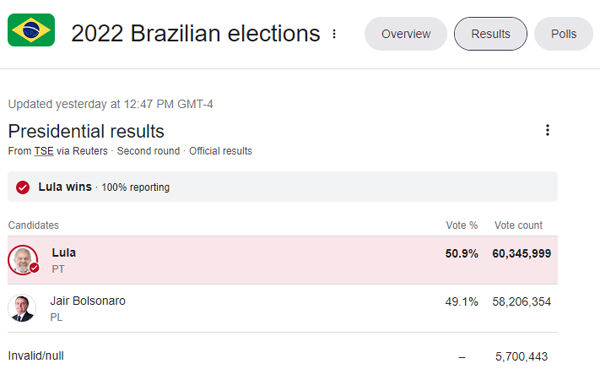
Former President Luiz Inácio Lula da Silva won Brazil’s runoff vote yesterday with 50.9 percent of the vote. Incumbent Jair Bolsonaro obtained 49.1%, giving Silva the smallest margin of victory since Brazil’s return to democracy. Lula received 60.3 million votes to Bolsonaro’s 58.2 million.
Lula who will govern a deeply polarized country, struck a conciliatory note in his victory speech. He said there are not “two Brazils” and promised to work to unite the country, following a particularly nasty election period.
Lula, the first president in Brazil’s democracy to win a third term, won in part due to his social programs’ track-record, and, in part, due to his opponent’s failures to govern, according to a Folha de S. Paulo editorial today.
Bolsonaro is the first president to lose a reelection bid in the 34 years since the end of Brazil’s military dictatorship. Bolsonaro and his sons remained silent following Lula’s win, neither conceding nor challenging the results. Bolsonaro has repeatedly and baselessly questioned the integrity of Brazil’s electronic voting system, and analysts feared he would challenge a loss. Many prominent Bolsonaro allies and right-wing pundits recognized Lula’s victory yesterday, somewhat assuaging concerns of a political crisis. Key Bolsonaro political allies, including lower house leader Arturo Liras and the newly elected governor of São Paulo, Tarcísio de Freitas, recognized Lula’s majority, which means Bolsonaro would have little support in an eventual challenge.
However, the Federal Highway Police confirmed that there have been blockades or agglomerations of truck drivers on roads in 11 states and the Federal District since last night.
Voters showed a country divided along socio-economic and geographic fault lines. Bolsonaro won in 14 of Brazil’s 27 states, with majorities in wealthier and more developed states. Lula obtained a landslide in Brazil’s 10 relatively poor north-eastern states.
World leaders rapidly congratulated Lula on his political comeback last night, including the U.S. president, Joe Biden, the U.K. prime minister, Rishi Sunak, the Russian leader, Vladimir Putin, and China’s Communist party chief, Xi Jinping.
Lula’s victory is a stunning political comeback, after spending nearly two years in jail on a corruption conviction that was later annulled by Brazil’s top court, which ruled the presiding judge had been biased and colluded with prosecutors.
Lula promised to maintain his core focus on alleviating poverty and improving social welfare, but also pledged a new focus on environmental issues — both fighting illegal deforestation and promoting green development. The president-elect has pledged to install a ministry for Brazil’s Indigenous peoples. He will face significant pushback on his agenda from a right-wing dominated Congress, however. And it is unclear how he will finance ambitious, though poorly detailed, plans to eradicate hunger, increase public infrastructure, and create daycare spaces for all infants.
Lula forms part of a wave of leftist governments in Latin America, elected in part due to anti-incumbent backlash.
(Folha de S. Paulo, Guardian, Reuters, Associated Press, New York Times, Washington Post, Guardian)
More Brazil
- The Federal Highway Police, an organization closely allied with the right-wing president, Jair Bolsonaro, allegedly set up roadblocks to delay voters in the country’s impoverished northeast and other centers of support for Lula, reports the Washington Post. Supreme Court Justice Alexandre de Moraes said checkpoints had delayed, but not prevented, voters from casting their ballots.
- A growing body of evidence that social platforms in Brazil failed to prevent a flood of disinformation — some of it tinged with violence — on their services ahead of the runoff election, reports the Washington Post.
Haiti
- Haitian opposition party leader Eric Jean Baptiste was killed in Port-au-Prince on Friday, in an alleged gang attack. “(Washington Post) He was on his way home with a member of his security team when their vehicle was shot up. The two were traveling through Laboule 12, a neighborhood that has become a battlefield in Haiti’s escalating gang violence, reports the Miami Herald.
- Haitian journalist died Sunday in Haiti after getting seriously injured when chaos broke out at a police substation in Port-au-Prince-— and he was hit in the head with a police tear gas canister, reports the Miami Herald.
- Nearly 100,000 Haitians have been displaced by gang-related violence, according to a report from the United Nation’s International Organization for Migration. (Miami Herald)
Jordana Timerman / Latin America Daily Briefing
http://latinamericadailybriefing.blogspot












